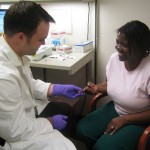THE ISSUE OF PHARMACIST CREDENTIALING and privileging continues to grow in the national consciousness as pharmacists seek to differentiate their skill sets in a crowded workplace. But how can the more than 60,000 outpatient pharmacy practices in clinics, health systems, and community settings demonstrate their own excellence in patient care?
The new Center for Pharmacy Practice Accreditation (CPPA), a partnership among ASHP, the National Boards of Pharmacy (NABP), and the American Pharmacists Association (APhA), was created to address that need. CPPA accreditation, according to Center Executive Director and former ASHP President Lynnae Mahaney, B.S.Pharm., M.B.A., FASHP, offers a way for ambulatory care clinics and others to demonstrate their value to patients, payers, and other healthcare providers.
Mahaney recently sat down with ASHP InterSections to talk about how the CPPA’s work will transform pharmacy practice.
Why did you want to lead the Center for Pharmacy Practice Accreditation?
I’ve always been a passionate proponent of the need for credentialing for pharmacy practice. We have to be able to show our value in a predictable, measurable, and specific way, and that’s what credentials do. I also believe that accreditation is an important means of moving pharmacy practice forward. Accreditation standards for how care is delivered in pharmacy practices should originate from within our own profession. That’s critical because we are the medication experts. We know what best practice is. And because ASHP, APhA and NABP have collaborated to create the Center, we serve a real purpose and niche in the accreditation marketplace.
Didn’t the CPPA recently accredit its first pharmacies under its community pharmacy practice standards?
Yes. In 2014, we rolled out the community pharmacy practice accreditation program and subsequently accredited three pharmacy practices: The discharge pharmacy for outpatients at Johns Hopkins Hospital in Baltimore, the Goodrich Pharmacy near Minneapolis, and the Medicine Shoppe in Two Rivers Wisconsin. We also recently released the new CPPA standards for specialty pharmacy practice accreditation, which we’re very excited about.
What qualities does a pharmacy practice need to qualify for accreditation?
We’re recognizing pharmacy practices for their quality, their patient care services, and their approach to medication safety. A practice must demonstrate an advanced and consistent level of high-quality patient care services across a spectrum of pharmacy care.
How long does accreditation process take?
It takes six to nine months from time of application to accreditation. A good portion of that time is dependent on factors such as how quickly the practice is able to submit written documentation of their compliance with the standards and successful completion of an onsite survey.
What value does CPPA accreditation have for ambulatory care pharmacy practice?
It recognizes the practice for its high level of performance and high-value patient care. That value can also be demonstrated to patients and healthcare providers and payers. I spend a lot of time talking with the payer community about the value of accredited pharmacy practices—practices providing patient care services that are contributing to positive patient outcomes.
For example, in order to get accredited, a pharmacy practice has to provide, at a minimum, medication therapy management and patient education and counseling. In addition, it has to provide two more patient care services, such as medication management for chronic disease states, immunization services, adherence services, etc. We know that these areas of care help keep patients healthy and improve outcomes.
What plans are you working on now?
ASHP, NABP, and APhA were very purposeful about why they came together to form this organization, which is to develop accreditation programs for pharmacy practice across the continuum of medication use. As a result, we are now looking at accreditation programs for nondispensing practices, for patient safety practices around medication use, and for acute care pharmacy practices. In addition, one of our goals is to offer accreditation for pharmacy practice across the entire medication-use process, including clinical management services.
Is interest in accreditation growing?
Yes, definitely… particularly when you start talking about specialty pharmacy practice standards. We are seeing a lot more interest on the community side for accreditation as well as from health systems that have multiple outpatient pharmacies. As a result, we’ve put together a process for accrediting practices in multiple areas, also called bundling. We also have a mechanism to accredit multi-site practices (including chain drugstores) that includes a headquarters survey and a sampling of locations for onsite surveys. I predict that, in the not-too-distant future, accreditation of pharmacy practice in ambulatory care settings will be the norm rather than the exception. It’s a very exciting time!
–Interview by Steve Frandzel









 If you want to contribute tutorials, news or other stuff please contact us. We pay 150 for each approved article.
If you want to contribute tutorials, news or other stuff please contact us. We pay 150 for each approved article. Consectetur adipisicing elit. Sed do eiusmod tempor incididunt ut labore.
Consectetur adipisicing elit. Sed do eiusmod tempor incididunt ut labore. This site uses valid HTML and CSS. All content Copyright © 2010 Newscast, Inc
This site uses valid HTML and CSS. All content Copyright © 2010 Newscast, Inc If you like what we do, please don't hestitate and subscribe to our
If you like what we do, please don't hestitate and subscribe to our